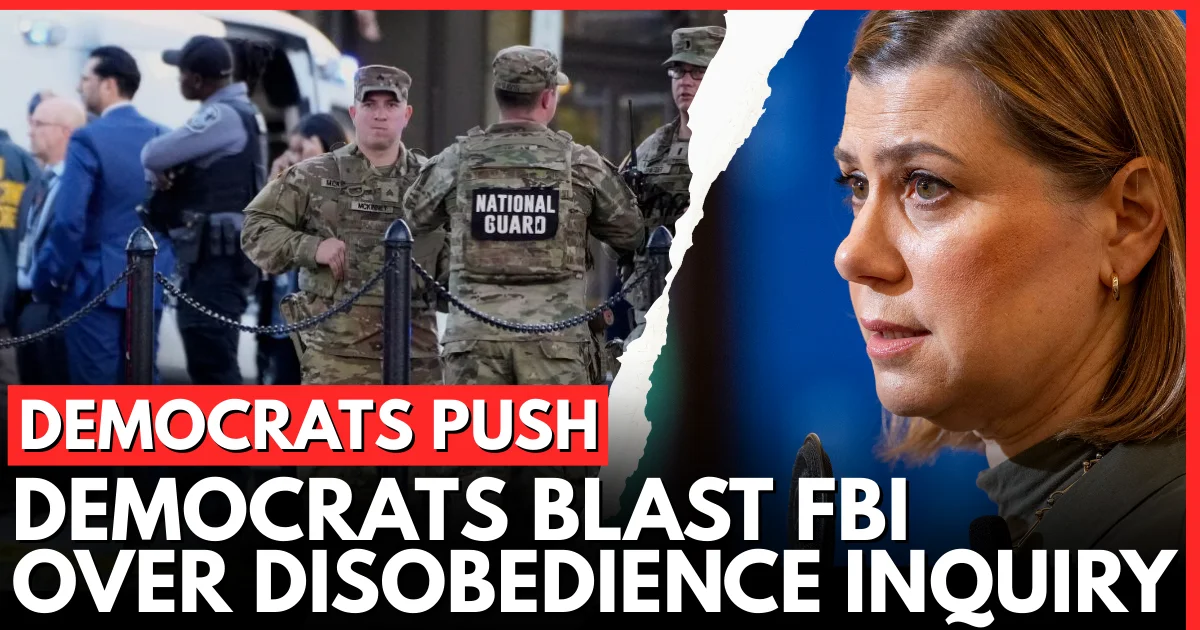Democratic lawmakers face alleged FBI investigation after urging troops to refuse illegal orders. They’re fighting back hard. Get the full story here.
Table of Contents
Democrats Push Back Hard Against Alleged FBI Probe Over Comments Urging Troops to Disobey Illegal Orders
A brewing confrontation between Democratic lawmakers and federal investigators is raising serious constitutional questions. Several Democrats who publicly encouraged military personnel to refuse illegal orders now face an alleged FBI investigation. They’re not backing down quietly, claiming the probe represents dangerous political retaliation.
What These Democrats Actually Said
The controversy centers on statements made by Democratic members of Congress regarding military obligations. These lawmakers publicly reminded service members of their legal duty.
Their core message included these points:
- Military personnel swear oaths to the Constitution, not individuals
- Unlawful orders should not be followed regardless of source
- Service members bear personal responsibility for their actions
- The Nuremberg principles remain relevant today
These statements weren’t made in secret. Democrats delivered them through official channels, press conferences, and media appearances.
They argued their comments simply restated existing military law. Critics accused them of encouraging insubordination and undermining command structures.
The Alleged FBI Investigation Emerges
Reports have surfaced suggesting the FBI opened investigative files on lawmakers who made these statements. The exact scope and nature of any investigation remain unclear.
| Aspect | What’s Reported |
|---|---|
| Subjects | Multiple Democratic members of Congress |
| Basis | Statements about refusing illegal orders |
| Status | Allegedly active investigation |
| Charges | None filed publicly |
| Agency response | Limited official comment |
The FBI typically declines confirming or denying specific investigations. This standard practice leaves lawmakers and the public uncertain about what’s actually happening.
However, enough information has emerged to spark significant pushback from those allegedly targeted.
Democrats Respond Forcefully
The lawmakers allegedly under investigation have mounted aggressive public defenses. They’re framing the situation as an assault on constitutional principles.
Key arguments from targeted Democrats:
- Speech or Debate Clause protections — The Constitution shields legislative speech from executive branch prosecution
- First Amendment rights — Political speech enjoys the highest constitutional protection
- Accurate legal statements — They merely restated existing military law obligations
- Political retaliation concerns — Investigation timing suggests partisan motivation
- Chilling effect dangers — Such probes discourage legitimate congressional oversight
One lawmaker reportedly stated that investigating Congress members for floor speeches crosses fundamental constitutional lines. Others have demanded immediate investigation termination.
Constitutional Protections at Stake
This confrontation raises profound questions about separation of powers. The Constitution specifically protects congressional speech through Article I provisions.
The Speech or Debate Clause states:
Members of Congress “shall not be questioned in any other Place” for “any Speech or Debate in either House.”
This protection exists to ensure legislators can speak freely without executive branch intimidation. Founders considered this safeguard essential to democratic governance.
Legal scholars suggest investigating lawmakers for legislative statements likely violates this clause. However, the precise boundaries remain subject to interpretation.
Key constitutional questions include:
- Do media appearances receive the same protection as floor speeches?
- Can investigations proceed even without eventual prosecution?
- What remedies exist if constitutional lines are crossed?
- How do courts balance security concerns against speech protections?
These questions may ultimately require judicial resolution.
The Military Law Context
Understanding this controversy requires examining what military law actually says about illegal orders. Democrats claim they simply described existing legal obligations.
Uniform Code of Military Justice provisions:
| Principle | Explanation |
|---|---|
| Lawful orders only | Service members must follow only lawful orders |
| Personal responsibility | Following illegal orders doesn’t excuse misconduct |
| Constitutional oath | Military swears to support the Constitution |
| War crimes liability | International law holds individuals accountable |
Military training includes instruction on these principles. Service members learn they bear responsibility for their actions regardless of orders received.
Democrats argue their statements merely echoed this training. Critics counter that public statements from lawmakers carry different weight than classroom instruction.
Political Dimensions Fuel the Fire
This situation doesn’t exist in a political vacuum. Deep partisan divisions shape how Americans interpret these events.
Perspectives from the left suggest:
- Investigation represents authoritarian overreach
- Political opponents are weaponizing federal agencies
- Democratic speech is being criminalized
- Constitutional norms face unprecedented erosion
Perspectives from the right suggest:
- Lawmakers encouraged military insubordination
- Statements undermined national security
- No one is above legitimate investigation
- Democrats face appropriate accountability
These competing narratives ensure the controversy generates intense reactions. Finding common ground appears unlikely given current polarization.
Historical Precedents and Comparisons
Tensions between Congress and executive branch investigators aren’t entirely new. History offers some relevant examples.
Past confrontations include:
- Congressional investigations into executive misconduct generating pushback
- Executive branch attempts to access legislative materials
- Court battles over separation of powers boundaries
- Scandals involving surveillance of political opponents
However, FBI investigations into sitting lawmakers for protected speech would represent unusual escalation. Most precedents involve different fact patterns.
Legal historians are watching this situation closely. The outcome could establish significant precedents affecting future congressional-executive relations.
What Happens Next
This confrontation appears headed toward escalation rather than quiet resolution. Multiple paths forward exist.
Potential developments:
- Congressional hearings — Lawmakers may hold public sessions examining the investigation
- Court challenges — Legal action could seek judicial intervention
- Inspector General review — Internal oversight may examine FBI conduct
- Public pressure campaigns — Both sides will mobilize supporters
- Media scrutiny — Ongoing coverage will shape public perception
The Justice Department faces pressure from multiple directions. Proceeding risks constitutional confrontation. Retreating invites accusations of political weakness.
Implications for American Democracy
Beyond individual lawmakers, this situation raises broader concerns about democratic health. Observers on both sides express worries, though about different things.
Institutional concerns include:
- Can Congress conduct oversight without fear of retaliation?
- Do federal agencies maintain appropriate political neutrality?
- Are constitutional safeguards being respected?
- What precedents are being set for future administrations?
Americans across the political spectrum should care about these questions. The answers affect everyone regardless of current partisan preferences.
Expert Legal Analysis
Constitutional law experts offer varying assessments of the situation’s legality and implications.
Former federal prosecutors note:
- Investigations into protected speech face severe legal obstacles
- Cases against lawmakers for congressional statements rarely succeed
- Resource expenditure on such investigations raises questions
Constitutional scholars observe:
- Speech or Debate Clause provides robust protections
- Executive branch encroachment on legislative function is concerning
- Courts historically defend congressional prerogatives
Civil liberties advocates warn:
- Even unsuccessful investigations create chilling effects
- Political speech requires maximum protection
- Prosecutorial discretion should avoid appearance of bias
FAQs
Can the FBI legally investigate members of Congress?
The FBI can investigate lawmakers under certain circumstances. However, the Constitution’s Speech or Debate Clause protects congressional speech from executive branch questioning. Investigations based solely on legislative statements likely face significant constitutional obstacles and legal challenges.
Are military members required to follow all orders?
No. Military law requires service members to follow only lawful orders. The Uniform Code of Military Justice establishes that following illegal orders doesn’t excuse misconduct. Military training emphasizes personal responsibility and constitutional obligations above blind obedience.
What is the Speech or Debate Clause?
The Speech or Debate Clause appears in Article I of the Constitution. It protects members of Congress from being “questioned in any other Place” for speeches and debates in legislative proceedings. This protection ensures lawmakers can speak freely without executive branch intimidation.
Have lawmakers ever been investigated for their speeches before?
Investigations into lawmakers for legislative speech are extremely rare and constitutionally problematic. While members of Congress have faced investigations for various alleged misconduct, targeting protected legislative speech represents unusual and legally questionable territory.
What could happen if the investigation continues?
If investigations proceed, targeted lawmakers could seek judicial intervention, congressional hearings could examine FBI conduct, and constitutional confrontations could escalate. Courts would likely need to resolve competing claims about separation of powers and protected speech.
Conclusion
The alleged FBI investigation into Democrats who encouraged troops to refuse illegal orders has ignited a constitutional firestorm. Targeted lawmakers insist their speech enjoys absolute protection. They’re refusing to back down.
This confrontation tests fundamental principles about congressional independence, free speech, and separation of powers. Whatever happens next will establish precedents affecting American democracy for years.
The nation watches as this high-stakes standoff unfolds between lawmakers and federal investigators.
Stay connected for continuing updates on this developing constitutional clash. Share your perspective in the comments below.

